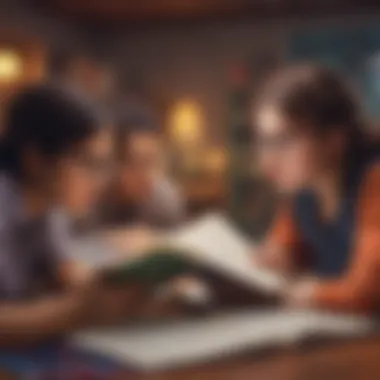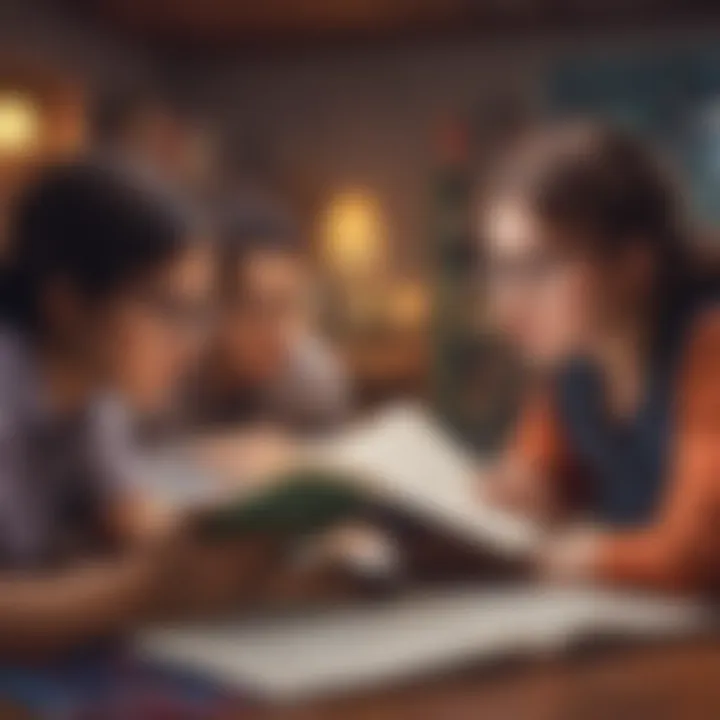The Impact of Educated Novels on Personal Growth


Intro
In a world saturated with information, the notion of what constitutes meaningful literature can often become muddled. Educated novels, however, stand apart. These are not just tales designed to entertain; they hold the potential to provoke thought, inspire change, and bolster personal development across various life stages. When one immerses oneself in stories that challenge the status quo or delve into the intricacies of human emotion and intellect, transformation is often a byproduct. This article aims to dissect the significance of educated novels in enhancing one's personal growth and intellectual engagement.
Key Concepts and Insights
Main Ideas from the Book
Educated novels enrich the reader’s experience through various significant themes. They encourage critical thinking by laying bare the complexities of human experiences, often blending reality with philosophical underpinnings. These narratives portray multiple perspectives on a given subject, urging readers to step into the shoes of different characters. For instance, novels like "To Kill a Mockingbird" by Harper Lee and "1984" by George Orwell not only entertain but also provide insight into societal norms and individual moral struggles.
Moreover, the language and style of educated novels often challenge auditory and cognitive boundaries, requiring the reader to engage more deeply with the text. This engagement cultivates a richer vocabulary and deeper understanding of nuanced concepts that are pivotal to personal and professional development.
Practical Applications of Concepts
Understanding the fundamental concepts within educated novels can aid in various aspects of life. The stories serve as lenses to view societal issues, historical events, and ethical dilemmas. Readers can take practical steps to internalize these lessons:
- Discussion Groups: Engage with others who have read similar novels to exchange thoughts and interpretations.
- Journaling: Reflect on how specific plots or characters resonate with personal experiences, promoting introspection and self-awareness.
- Literary Analysis: Dive deeper into texts to tease out themes and motives, honing analytical skills that are extremely useful in academic and career settings.
"Books are a uniquely portable magic." - Stephen King
Recommendations and Further Reading
Related Books to Explore
To widen the personal development spectrum, several other educated novels merit attention. These include:
- "Pride and Prejudice" by Jane Austen
- "The Great Gatsby" by F. Scott Fitzgerald
- "Brave New World" by Aldous Huxley
- "The Alchemist" by Paulo Coelho
Additional Resources for Personal Development
Beyond the novels themselves, various resources exist to enrich the reading experience and facilitate growth:
- Podcast Series: "The Art of Charm" on personal growth strategies.
- Community Forums: Platforms like Reddit (reddit.com) can offer discussions, analysis, and recommendations from diverse readers.
- Online Courses: Coursera and edX provide literature courses that delve into the critical aspects of classic educated novels.
By immersing oneself in these narratives and accompanying resources, individuals can navigate their paths toward continual self-improvement.
Understanding Educated Novels
Educated novels play a significant role in today’s literary landscape, especially in the realm of personal development. These works, often categorized by their depth, complexity, and thought-provoking themes, go beyond mere storytelling. They challenge readers to reflect on their own lives, beliefs, and values. In this article, we shall delve into what sets educated novels apart, their defining traits, and the historical backdrop that led to their evolution. Understanding educated novels can empower readers with a transformative experience, encouraging personal growth as well as critical thinking skills.
Definition and Characteristics
Educated novels can be characterized as narratives that intertwine intricate plotlines with profound thematic explorations. They often grapple with complex issues such as identity, morality, and the human condition. These novels do not simply entertain; they provoke thought and discussion.
Key characteristics include:
- Depth of characters: Protagonists tend to be multi-dimensional, facing conflicts that resonate with larger societal issues.
- Theme exploration: Topics such as existentialism, social justice, and self-discovery are frequently found.
- Narrative style: They often employ various literary techniques, such as metafiction and unreliable narrators, which prompt readers to question the very nature of storytelling and truth.
These traits create a fertile ground for cultivating awareness, empathy, and a critical lens through which to examine one’s life experiences. Readers often find themselves reflecting on their own beliefs or circumstances after engaging with such narratives.
Historical Context and Evolution
The emergence of educated novels can be traced back to significant literary movements, especially during the Enlightenment and the modernist period. These eras marked a shift from traditional storytelling to a focus on the internal landscape of characters, highlighting psychological depth and societal critique.
In both the 18th and 19th centuries, writers like Jane Austen and Fyodor Dostoevsky introduced characters entrenched in social dilemmas and ethical conflicts. These early works paved the way for later authors who expanded on these ideas, emphasizing education's role in personal growth.
Notable influences in the evolution of educated novels:
- The Renaissance: A period that sparked interest in individualism and humanism, leading to rich character-driven narratives.
- The rise of the novel as a literary form: Novels became a popular medium for exploring the complexities of human experience, often blending fiction with factual elements, encouraging educated discussions.
- Post-World War II: Literature began to reflect existential angst and individual crises, as seen in works like Albert Camus's "The Stranger" or Joseph Heller’s "Catch-22".
This historical journey has shaped educated novels into a platform that continues to inspire readers by prompting necessary discussions about identity, society, and morality. As literature continues to evolve, the relevance of educated novels remains pivotal in developing thoughtful, engaged individuals.


Themes in Educated Novels
Educated novels serve as a fertile ground for exploring vital human questions. They delve into complex themes that stretch the imaginations and stir the intellect of readers. These narratives resonate because they address fundamental issues we face in our own lives, often sparking a sense of connection or a deeper understanding of our society. Readers find reflection in these themes, allowing personal growth as they navigate through complex characters and intricate plots.
Exploring Identity and Self-Discovery
Identity is at the heart of many educated novels. Authors tend to create intricate characters who grapple with who they are versus who society expects them to be. For instance, in "The Bell Jar" by Sylvia Plath, the protagonist, Esther Greenwood, embarks on a quest of self-exploration against the backdrop of societal norms. Through her struggles, readers are driven to confront their own identities.
"Identity is like a puzzle; the more pieces you find, the clearer the image becomes."
Through stories of self-discovery, readers are often prompted to ponder their core beliefs and values. This introspection not only drives empathy but also cultivates a sense of resilience. Many young readers, especially those in transitional stages of their lives—be it adolescence or adulthood—find solace in these narratives, ultimately leading to a more authentic self.
Social Justice and Ethical Dilemmas
Another prevailing theme in educated novels is the exploration of social justice and ethical dilemmas. These narratives often highlight societal flaws, awakening readers to various injustices in the world. Works like "To Kill a Mockingbird" by Harper Lee challenge preconceived notions about race, morality, and justice itself. Readers are forced to confront uncomfortable questions about their own opinions and biases.
Educated novels can serve as a mirror to society, reflecting its strengths and weaknesses. The discussions that arise from these narratives can be influential, molding perspectives and inspiring advocacy. When readers engage with these texts, they not only gain insight into the lives of others but also feel motivated to act in a manner that promotes fairness and equity within their own communities.
The Role of Education in Personal Growth
Education is not merely a backdrop in these novels; it plays an inherent role in personal development. Characters often undergo a transformation through learning, be it formal education or life lessons. For instance, in "Educated" by Tara Westover, the author illustrates how knowledge transcends formal schooling, leading to profound life changes.
As characters engage with various educational experiences, readers are encouraged to reflect on their own paths. Learning becomes not only an external pursuit but also an internal journey that can reshape one’s understanding of the world. This theme serves as a reminder that growth often comes from seeking knowledge in all its forms.
In summary, the themes encapsulated in educated novels—identity, social justice, and the value of education—forge a path for readers toward personal development. These narratives challenge and inspire, pushing individuals to explore deeper into their thoughts, beliefs, and ultimately, their lives.
Impact of Educated Novels on Readers
Educated novels play a crucial role in shaping how readers perceive the world around them. These texts not only entertain but often challenge the way individuals think and feel about various topics, creating a deeper connection between the literature and the reader's personal growth. Through intricate narratives and complex characters, educated novels can amplify critical thinking and pave the way for introspection. This discussion will explore the multifaceted impact of these novels, breaking down specific elements that contribute to their importance.
Enhancing Critical Thinking Skills
Engaging with educated novels can markedly enhance critical thinking skills. Readers are frequently prompted to analyze characters’ motives, question societal norms, and evaluate underlying messages in the narratives. This deep engagement requires a reader to go beyond surface-level understanding, urging them to dissect themes and arguments critically.
For instance, consider George Orwell's 1984. The complex interplay of language and power in this novel challenges readers to think critically about the manipulation of information in society. By questioning the motives behind the actions of characters, readers sharpen their analytical skills, ultimately becoming more adept at evaluating real-world situations.
Additionally, when readers encounter conflicting viewpoints or moral ambiguities within these novels, they are often nudged toward examining their own beliefs and assumptions. This process fosters a more nuanced perspective, encouraging individuals not just to accept information at face value but to delve deeper into the implications of their understanding.
Fostering Empathy and Understanding
Educated novels are also instrumental in fostering empathy and understanding. Narratives that feature diverse characters and experiences invite readers to walk a mile in someone else's shoes. The emotional depth conveyed through storytelling allows readers to connect with characters on a personal level, making their struggles and triumphs feel relevant and significant.
Take The Kite Runner by Khaled Hosseini, for example. The journey of Amir, a young boy navigating complex social dynamics in Afghanistan, enables readers to appreciate the intricacies of friendship, betrayal, and redemption. Through Amir's eyes, readers can view the world from a vantage point they may never have encountered otherwise. This kind of exposure to different perspectives cultivates tolerance and open-mindedness, which are essential components in today's increasingly interconnected world.
Stimulating Personal Reflection
Another noteworthy impact of educated novels is their ability to stimulate personal reflection. As readers navigate various plots, they often find themselves relating to the characters’ experiences, leading to moments of introspection that can be transformational. These stories prompt individuals to consider their own lives, decisions, and values.
For instance, in reading Pride and Prejudice by Jane Austen, readers might engage in self-reflection about their own prejudices or understandings of love and marriage. Such reflections can lead to personal growth, encouraging individuals to challenge their ideals and beliefs.
"Reading is a lifelong love affair with oneself; through novels, we come to understand both ourselves and those around us.”
By diving into the rich tapestry of educated novels, readers may find insights about their own lives, encouraging a continual exploration of intellectual and emotional landscapes. Ultimately, the impact of reading these novels extends far beyond the pages, shaping readers' thoughts and actions in their everyday lives.
Key Educated Novels Worth Reading
In the realm of literature, some books stand out like a lighthouse guiding ships through a foggy night. These educated novels don't just tell a story; they engage the mind, challenge our norms, and often leave us pondering long after the final page is turned. Being introduced to educated novels means immersing oneself in worlds rich with philosophical inquiry, character depth, and societal critique.
These narratives offer not just entertainment but also serve as vehicles for personal development. The characters' journeys often mirror our own, shedding light on our values, aspirations, and even fears. Engaging with these stories can prompt readers to reflect on their lives, encouraging growth in various facets of themselves.
Classics That Have Shaped Thought


When it comes to classics, the first name that springs to mind is Pride and Prejudice by Jane Austen. This novel transcends time, exploring themes of social stratification and individual agency. Through Elizabeth Bennet's journey, readers are invited to examine their prejudices and societal expectations. The dialogue in the book is both witty and critical, prompting readers to consider their perceptions of class and relationships.
Another important title is 1984 by George Orwell. This dystopian novel serves as a stark reminder of the potential for government overreach and the fragility of personal freedoms. Orwell’s insight into totalitarianism pushes readers to think critically about their own political landscapes and the implications of unchecked power. The themes of surveillance and misinformation strike chords that resonate even in today’s digitally dominated world.
Many might also find To Kill a Mockingbird by Harper Lee enlightening. Set in the racially charged American South, this novel dives deep into the complexities of moral integrity and the fight against prejudice. Scout Finch’s innocent perspective exposes the ugly realities of societal inequalities, allowing readers to confront uncomfortable truths about justice and humanity.
- Key Takeaways from the Classics:
- Engage with complex societal themes.
- Reflect on personal and societal values.
- Encourage critical thinking regarding norms and beliefs.
Contemporary Works Emerging in the Genre
As times change, so do the narratives that shape our understanding of personal and social issues. Authors like Chimamanda Ngozi Adichie have emerged with powerful works that speak to contemporary audiences. Her novel Americanah covers themes of race, identity, and the immigrant experience, compelling readers to grapple with questions of belonging and perception in a fractured world.
Similarly, The Underground Railroad by Colson Whitehead reinvents the narrative surrounding American slavery. By using a fantastical approach to deliver a harrowing tale, Whitehead encourages readers to confront historical injustices while examining the threads of resilience woven throughout. The urgency and depth of these contemporary works impress upon readers the importance of historical context in understanding today's challenges.
For those interested in a more personal narrative, Educated by Tara Westover presents a compelling memoir about the transformative power of education. Westover's own journey from an isolated upbringing to earning a PhD at Cambridge highlights the key role of education in reshaping one's destiny. Readers witness the stark contrast between formal education and the absence of it, eliciting reflections on the value of knowledge and self-discovery.
- Contemporary Works Highlights:
- Address pressing social issues.
- Engage with personal journeys of transformation.
- Encourage self-reflection on broader societal impacts.
In the world of educated novels, the past and present collide, providing readers with invaluable insights into both their lives and the society around them.
Together, classics and contemporary works form a rich tapestry of literature that challenges, inspires, and ultimately contributes to personal growth.
Strategies for Engaging with Educated Novels
Approaching educated novels with a well-thought-out strategy can significantly enhance both enjoyment and personal development. Like planting a seed, intentional engagement allows the narrative to take root and flourish in one’s mind. Without these strategies, readers might risk skimming the surface without grasping the deeper themes. In this section, we explore three essential strategies: setting intentions, taking diligent notes, and joining discussions.
Setting Intentions for Reading
Setting intentions before diving into a book can reshape the reading experience. When one reads with purpose, it becomes easier to draw connections between the story's themes and personal experiences. Consider what you hope to gain from the novel: Is it a new perspective on life? A deeper understanding of a particular topic? Or perhaps simply the pleasure of good storytelling? Focusing your reading intention can affect how you interact with the text.
When starting a new educated novel, take a moment to reflect:
- What themes resonate with your present life?
- Are there specific questions you wish to explore?
- Can you relate the background of the author to your own experiences?
This initial contemplation may set the stage for a richer reading journey, allowing for personal insights to surface more readily as you progress through the text.
Taking Notes and Summarizing Key Concepts
The act of jotting down notes while reading can be incredibly beneficial. This method not only helps to retain information but also promotes active engagement. Rather than passively absorbing words on a page, readers become participants in a dialogue with the author. Summarizing key concepts at the end of each chapter or segment provides a way to distill complex ideas into manageable thoughts.
Here are a few practical tips for taking effective notes:
- Use bullet points to highlight main ideas and arguments.
- Create a character map to track relationships in the story.
- Note passages that evoke strong emotions or thoughts for later reflection.
After finishing a chapter, a brief summary can clarify the narrative's direction and refresh one’s recollection of the main ideas. This practice of distillation not only aids memory but enriches future reflections when discussing or analyzing the work.
Joining Discussions and Book Clubs
Discussion platforms such as book clubs or online forums present an invaluable opportunity to engage with others. The exchange of ideas in a group setting offers perspectives that may never emerge in solitary reading. Conversations can deepen understanding by revealing how different individuals interpret themes and characters differently. Joining a community allows readers to challenge their own viewpoints and consider alternative interpretations.
- Online forums, like those found on Reddit, provide spaces where you can debate and delve into readings with peers around the globe.
- In-person book clubs foster a sense of camaraderie, making the act of reading feel less like a chore and more like an adventure shared amongst friends.
Engaging in discussions not only bolsters comprehension but can also spark motivation to tackle more challenging texts, reinforcing the value of educated novels in personal development.
"Discussion is the fuel that powers understanding, like a fire feeding off fresh wood."
Limitations and Critiques of Educated Novels


The importance of discussing limitations and critiques of educated novels stems from a need for a balanced understanding of the genre. While these novels offer tremendous intellectual engagement and can drive personal development, they also face important considerations that may deter some readers. Addressing these limitations allows us to recognize the full scope of their impact on society and the individual.
Accusations of Elitism
Some critics argue that educated novels tend to project an aura of elitism. This stems from the perception that the narratives often cater to a specific audience—usually an educated middle or upper class. For instance, novels written by established authors with literary accolades may come across as inaccessible to lay readers, making them feel excluded from the conversation.
In such instances, the language and thematic complexity can alienate readers who may not have the background to fully appreciate the nuances. Additionally, this elitist portrayal sometimes raises questions about who gets to tell these stories. A rich text laden with vocabulary and intricate ideas might engage one reader deeply, while another finds it bewildering and off-putting.
However, it’s essential to acknowledge that novelists often write from their contexts, which can unavoidably privilege certain perspectives over others. Some readers find that engaging with these texts can broaden their horizons, while others might feel pigeonholed. This duality illustrates the problem of assuming all educated novels hold the same value for every reader.
The Balance Between Accessibility and Depth
Navigating the territory between accessibility and depth in educated novels is like walking a tightrope for authors. One way to connect with a broader audience is to simplify language and style, but this could strip the work of the depth that ultimately creates a rewarding reading experience. The challenge lies in crafting a narrative that is both engaging and thought-provoking, without losing the intricate details that give the text weight.
Many authors strive to strike this balance. For example, some contemporary educated novels incorporate approachable language while still engaging in complex themes, such as The Kite Runner by Khaled Hosseini. This approach allows a wider readership to engage with rich ideas without the intimidation that might come with more dense literature.
In contrast, novels with unyielding depths may become a treasure trove for critical thinkers yet remain less inviting for the casual reader. Recognizing this trade-off is crucial for aspiring educational advocates who wish to foster open literary communities that encourage personal growth across diverse demographic backgrounds.
Ultimately, critiques surrounding educated novels and their perceived elitism or accessibility issues provide essential conversations. By holding a mirror to these factors, readers can engage more meaningfully with literature that aspires to educate, inspire, and provoke thought while remaining aware of the challenges involved.
The Future of Educated Novels
As we look ahead, the landscape of literature continues to evolve, and so does the role of educated novels in enhancing personal development. The future of these narratives is not merely about preserving the past but also about adapting to contemporary realities and needs. This evolution is crucial for engaging with diverse audiences and reflecting the complex tapestry of human experience. Educated novels will not only continue to inspire critical thinking, but they can also serve as effective tools for self-discovery and enlightenment in an ever-changing world.
Trends Influencing New Narratives
One significant trend shaping the future of educated novels is the increasing diversity in authorship and storytelling. We see a richer array of voices coming to the forefront, each distinct in their experiences and viewpoints. This diverse representation fosters a wider range of themes and issues, allowing readers to explore not just traditional narratives but also underrepresented stories. For instance, novels by authors from various cultural backgrounds contribute to a more inclusive literary canon, challenging old paradigms and encouraging readers to reflect on different aspects of identity and society.
Moreover, themes surrounding climate change, social justice, and technology are increasingly prevalent. These topics resonate deeply with today's readers, sparking discussions that extend beyond the pages of the novels. When readers engage with these important issues through educated novels, they often find themselves navigating the moral complexities involved, leading to personal growth and a deeper understanding of the world.
Additionally, the blending of genres, where fiction meets autobiography or speculative fiction intersects with historical narratives, is becoming more common. This crossover not only broadens the appeal of educated novels but also invites readers to engage with texts on multiple levels, examining personal stories within the context of larger societal issues.
The Role of Technology in Reading Experiences
The role of technology cannot be understated when it comes to the future of educated novels. Digital platforms and e-books have opened up new avenues for reading, making literature more accessible than ever before. Readers can now access a vast library of works with just a few clicks, breaking down geographical barriers. This accessibility encourages reading habits across various demographics, allowing many to discover and engage with educated novels who might not have had the opportunity otherwise.
However, it is vital to strike a balance between technology and traditional reading experiences. While audiobooks and e-readers offer conveniences, the tactile feeling of a book’s pages can provide a unique connection to the text. Each format comes with its own set of advantages, and understanding how to leverage these technologies can enhance the reading and learning process. Notably, many platforms also offer interactive features—like discussion forums and multimedia content—that enrich a reader's experience.
Furthermore, online communities, such as those found on Reddit or Facebook, enable discussions around educated novels, promoting shared learning and diverse views. Engaging with literary communities online can illuminate different interpretations and personal connections to educated novels, amplifying their impact.
In essence, there is a bright horizon ahead for educated novels as they adapt to contemporary needs while remaining significant in fostering personal development.
Culminations and Reflections
The conclusions drawn from examining educated novels reveal their profound significance in personal development. These narratives not only stimulate intellectual curiosity but also encourage self-exploration and critical thinking. As discussed throughout this article, educated novels navigate complex themes that resonate with readers, prompting them to reflect on their beliefs, attitudes, and experiences. The act of engaging with these texts can serve as a powerful catalyst for change, inspiring individuals to seek deeper understanding of themselves and the world around them.
One clear benefit of these novels is their ability to challenge prevailing worldviews. This can lead to a reassessment of thoughts and behaviors, ultimately motivating readers toward personal growth. As one reflects on characters’ journeys, it becomes evident that they are not merely fictional accounts but mirrors reflecting our own lives.
Moreover, in an age where distractions abound, the commitment to understanding educated novels fosters discipline in reading habits. This practice, if maintained, can cultivate a lifelong passion for learning, critical to ongoing personal and professional development.
"Educated novels serve as more than stories—they are tools for change, sparking our imagination and lifting the veil off our seemingly inconspicuous lives."
The notions presented throughout this article underscore the timeless relevance of educated novels. They encourage a journey into the realm of introspection, wherein readers can analyze their lives in correlation with narratives unfolding on the pages.
The Enduring Value of Educated Novels
Educated novels are invaluable as they provide insight into not only different cultures and perspectives but also human experiences that bind us all. Their enduring value lies in the ability to maintain relevance across generations. For instance, works like Pride and Prejudice by Jane Austen or 1984 by George Orwell will continue to resonate regardless of the era because they delve into timeless themes of identity, authority, and moral choices.
Furthermore, these novels often explore the intricacies of human relationships, presenting nuanced interactions that can prompt readers to reflect on their own social lives. Readers may find themselves grappling with questions of loyalty, ambition, and the complexities of love, which can guide introspective discussions in book clubs or other social settings. In addition, the narrative depth of educated novels promotes critical engagement with their characters, often leading to a more enriching reading experience.
Encouraging Lifelong Reading Habits
Integrating educated novels into daily routines can lay the groundwork for lifelong reading habits. Simple strategies can make a world of difference; for example, setting aside a specific time each day for focused reading can enhance concentration and enjoyment. Starting with shorter novels or essays can gradually build up the habit without feeling overwhelming.
Additionally, joining local or online book clubs creates a communal environment conducive to discussion. Knowing others share the journey of reading encourages accountability and fosters a sense of belonging. Through shared insights and diverse perspectives, readers gain richness in understanding different viewpoints.
Moreover, retaining notes or thoughts on key themes while reading can deepen engagement with the text. This practice can cultivate a personal library of ideas and reflections that serve as reference points for future exploration. Sustained curiosity and a commitment to challenging reads not only elevate the individual reader’s experience but contribute to an ongoing culture of learning.







